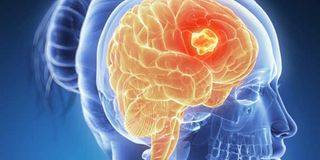Brain can help detect infections

The human brain is capable of detecting that someone is in the early stages of disease, even before it breaks out, and prompting people to act on that information by avoiding them. GRAPHIC | FILE
What you need to know:
- The researchers took smell samples from the participants, who were also photographed and filmed.
- After a few hours, the injected substance disappeared from the participants’ bodies along with the symptoms of illness. The second group of participants was exposed to the smells from the first group of participants as well as their photos and films.
The human brain is capable of detecting that someone is in the early stages of disease, even before it breaks out, and prompting people to act on that information by avoiding them.
Researchers from the Karolinska Institutet in Sweden, came to this conclusion after injection harmless sections of bacteria to activate the immune response in participants who developed symptoms of disease such as fever, pain and tiredness for a few hours.
The researchers took smell samples from the participants, who were also photographed and filmed.
After a few hours, the injected substance disappeared from the participants’ bodies along with the symptoms of illness. The second group of participants was exposed to the smells from the first group of participants as well as their photos and films. They were also exposed to smells and images of healthy participants from a control group.
SIGNIFICANT DIFFERENCE
The second group was asked to rate how much they liked the people they had smelt and seen, while their brain activity was measured in a magnetic resonance scanner. They were asked to state, just by looking at the photographs, which participants looked sick, which they considered attractive and which they might consider socializing with.
“Our study shows a significant difference in how people tend to prefer and be more willing to socialise with healthy people than those who are sick and whose immune system we artificially activated,” says Professor Olsson.
“We can also see that the brain is good at adding weak signals from multiple senses relating to a person’s state of health,” said principal investigator Professor Mats Olsson at Karolinska Institutet’s Department of Clinical Neuroscience.
This he sees as biological confirmation of the argument that survival naturally entails avoiding infection.
“Avoidance, however, does not necessarily apply if you have a close relationship with the person who is ill,” he added. The study was published in the journal Proceedings of the National Academy of Sciences

